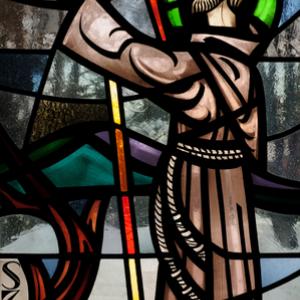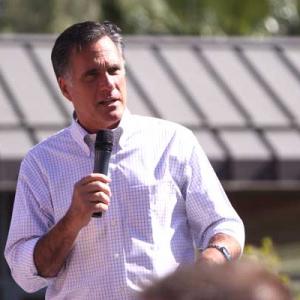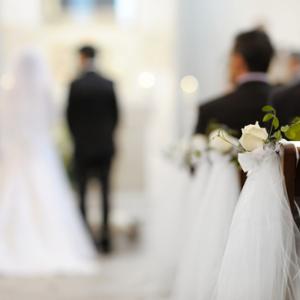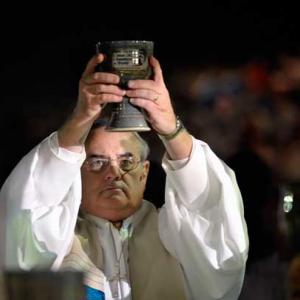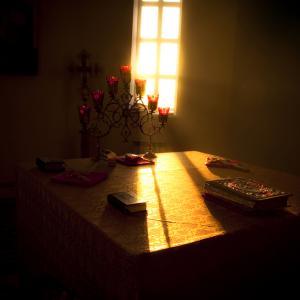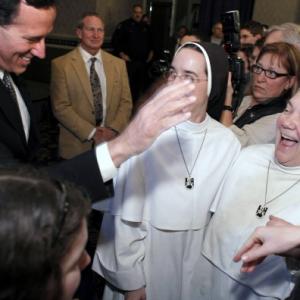Posts By This Author
Religious Groups Vie for Internet Space in Domain Name Grab
Religious groups have long vied for prime parcels of land, planting churches on town squares and monasteries amid isolated mountains. But now they’re targeting real estate in a less tangible sphere: cyberspace.
For the first time in its history, the international nonprofit that doles out generic Internet domain names such as “.com” and “.edu” will allow more specific web address extensions like “.church.”
Hundreds of companies, Internet entrepreneurs and cities submitted nearly 2,000 applications, seeking the right to own everything from .app to .zulu, the Britain-based International Corporation for Assigned Names and Numbers announced last on June 14.
Franciscan Friars Back American Nuns in Vatican Spat
The brothers have come to the sisters’ defense.
Leaders from the seven Franciscan provinces in the U.S. publicly backed a group of American nuns on Thursday (June 7), calling a Vatican crackdown on the women “excessive.”
The Franciscan friars are believed to be the first Catholic religious order to voice support for the Leadership Conference of Women Religious since the Vatican announced a full-scale makeover of the group in April.
The Vatican’s “doctrinal assessment” also faulted the sisters for sponsoring conferences that featured “a prevalence of certain radical feminist themes incompatible with the Catholic faith.”
Noting that many members of LCWR belong to female Franciscan orders, the friars pledged solidarity with the sisters and called the Vatican assessment “excessive, given the evidence raised.”
With Nomination Clinched, Focus Turns to Romney’s Mormon Faith
Mitt Romney clinched the GOP presidential nomination on May 28, becoming the first Mormon selected by a major political party. But will his barrier-breaking faith be a boon or bane to his White House campaign?
The answer to that question could presage the next president, and two studies published in May come to contradictory conclusions.
In both studies people were given information about Romney and his Church of Jesus Christ of Latter-day Saints, then asked whether they would be more or less likely to vote for him.
Does Love Last Longer in Arranged Marriages?
Elke Thompson’s high-school friends think she’s nuts, she said. But in the Unification Church, arranged marriages are the norm. The Rev. Sun Myung Moonteaches that romantic love leads to sexual promiscuity, mismatched couples and dysfunctional societies.
Several religions practice arranged marriages. Hindu and Jewish matchmakers abound, for instance. But rarely does it rise to the level of dogma. Unificationists believe that marriages arranged through the church and blessed by Moon are “sinless” and foster the kingdom of God on earth, one happy family at a time.
Why the United Methodist Church Canceled Votes on Same-Sex Marriage, Gay Clergy
United Methodists concluded their General Conference last Friday (May 4) without voting on gay clergy or same-sex marriage, a surprising end to a disappointing week for gay activists.
Last Thursday, the nearly 1,000 delegates gathered in Tampa, Fla., soundly rejected two motions that would have amended the United Methodist Church's book of doctrine and rules, which calls the practice of homosexuality "incompatible with Christian teaching." After those votes, protesters flooded the convention floor, briefly shutting down the conference.
Conference planners, evangelical leaders and gay and lesbian advocates met later on Thursday and determined that there was little use in holding additional contentious debates on homosexuality, according to several sources. Proposals to ordain gay clergy and bless same-sex unions held little chance of passing, the parties agreed, and so were pushed to the back of the agenda, essentially assuring that they would not be debated.
"Leaders of the demonstration were told that the legislation was postponed to avoid more harm to LGBT people and their supporters," the Love Your Neighbor Coalition said in a statement. "The United Methodist Church had an opportunity to offer love, grace, and hope," the coalition said. "Sadly, we did not take that opportunity."
Methodists Uphold Policy Calling Homosexuality 'Incompatible with Christian Teaching'
Despite emotional protests and fierce lobbying from gay rights groups, United Methodists voted on Thursday to maintain their denomination's stance that homosexuals acts are "incompatible with Christian teaching."
Two "agree to disagree" proposals were soundly defeated during separate votes by the nearly 1,000 delegates gathered for the United Methodist Church's General Conference in Tampa, Fla.
One proposal would have replaced the "incompatible" phrase in the Book of Discipline, which contains the denomination's laws and doctrines. Both proposals sought to soften the disputed doctrine by adding more ambiguous statements about homosexuality.
Gay rights advocates in the UMC viewed the compromise proposals as the best chance to advance their cause at this year's General Conference, which convenes every four years. On Friday, delegates are expected to debate the church's bans on noncelibate gay clergy and same-sex marriage.
United Methodists Reject Calls for Divestment from Israel-Related Companies
United Methodists twice rejected measures on Wednesday (May 2) that called for the denomination to divest from companies accused of contributing to the Israeli occupation of Palestinian territories.
Neither vote was particularly close, with about two-thirds of the 1,000 delegates gathered in Tampa, Fla., through May 4 rejecting the calls for divestment.
The UMC rejected similar measures at its last General Conference in 2008.
United Methodists to Debate Allowing Gay Clergy and Same-Sex Marriage
As nearly 1,000 delegates from across the world gather in Tampa, Fla., for the United Methodist Church's General Conference, gay and lesbian activists have printed pamphlets promoting their cause in five languages, including Portuguese and Swahili.
The UMC's global reach, stretching from the Philippines to Philadelphia, compels the multilingual lobbying. Nearly 40 percent of the delegates, who meet through May 4, live outside the United States, according to church leaders.
“We see it as a challenge to deal with the cultural differences,” said Bishop Rosemarie Wenner of Germany, who will be installed in Tampa as president of the UMC’s Council of Bishops. “But we also see it as a gift.”
Why Ross Douthat Thinks We’re ‘A Nation of Heretics’
New York Times columnist Ross Douthat doesn't mince words in his new book "Bad Religion: How We Became a Nation of Heretics.''
Since the 1960s, Douthat argues, institutional Christianity has suffered a slow-motion collapse, leaving the country without the moral core that carried it through foreign wars, economic depressions and roiling internal debates.
In its place heresies have cropped up -- from the “God-within” theology of Oprah to the Mammon-obsessed missionaries of the prosperity gospel, says Douthat, a Roman Catholic.
Ohio Congressman on a Mission to Bring Meditation to the Masses
By age 35, Congressman Tim Ryan had been one of Ohio’s youngest state senators, served two terms in the U.S. Congress and hobnobbed with presidents and prime ministers.
But a different story, full of unmet ambitions and caustic self-criticism, coursed through Ryan's mind, carrying him away from even the most important moments.
“I was so caught up in my story that I missed my life,” the Ohio Democrat writes in his new book, “A Mindful Nation: How a Simple Practice Can Help Us Reduce Stress, Improve Performance, and Recapture the American Spirit.”
What Did Jesus Do on Holy Saturday?

Photo via prudkov / Shutterstock
Every Christian knows the story: Jesus was crucified on Good Friday and rose from the dead on Easter Sunday. But what did he do on Saturday?
That question has spurred centuries of debate, perplexed theologians as learned as St. Augustine and prodded some Protestants to advocate editing the Apostles' Creed, one of Christianity's oldest confessions of faith.
Roman Catholic, Eastern Orthodox and most mainline Protestant churches teach that Jesus descended to the realm of the dead on Holy Saturday to save righteous souls, such as the Hebrew patriarchs, who died before his crucifixion.
Santorum's Secret Army: Home-Schoolers
Strapped for cash and staff, Rick Santorum has enlisted a ragtag but politically potent army to keep his campaign afloat: home-schoolers.
Heading into today's Super Tuesday, Santorum was urging home-schoolers to organize rallies, post favorable features on social media and ring doorbells on his behalf.
"Santorum has been very aggressive in reaching out to the home-schooling community, especially in the last month," said Rebecca Keliher, the CEO and publisher of Home Educating Family Publishing.
Drawing on his experience as a home-schooling father of seven, the former Pennsylvania senator has also sought to rally enthusiasm by pledging to continue that course in the White House.
"It's a great sacrifice that my wife, Karen, and I have made to try to give what we think is the best possible opportunity for our children to be successful," Santorum said during a March 1 campaign stop in Georgia. "Not just economically, but in a whole lot of other areas that we think are important — virtue and character and spirituality."
Breakaway Anglicans Ordered to Return Property by April 30
A Virginia judge has ordered seven congregations that broke from the Episcopal Church to return all property to the local diocese — from valuable land to sacred chalices — by April 30.
The Diocese of Virginia had wanted the properties returned by March 30, a week before Easter. But Fairfax County Circuit Court Judge Randy Bellows agreed to give the breakaway congregations more time.
In a closely watched case that reached the Virginia Supreme Court, Bellows ruled in January that congregations had the right to leave the Diocese of Virginia, but not to take church property with them.
Mitt Romney Trouncing Rick Santorum Among Catholics
Mitt Romney has trounced Rick Santorum, an ardent Catholic, among Catholic voters, but Romney's support among evangelicals has wavered thus far in the GOP presidential primary, according to a new analysis of exit poll data.
Though he won evangelicals in two states, in general Romney has performed 15 percentage points better among non-evangelicals, according to an analysis released March 2 by the Pew Forum on Religion & Public Life.
Exit poll data is available in seven of the 11 states that have held primary contests to date, according to the Pew Forum. More detailed religious affiliations are available in six of those states.
White evangelicals formed more than a third of all GOP primary voters in each state except for Nevada (24 percent) and New Hampshire (21 percent). Romney, a Mormon, won the evangelical vote in those two states, and nearly tied for first in Arizona and Florida. But he lost the evangelical vote badly in three states: Michigan, Iowa and South Carolina.
Somewhat surprisingly, Santorum has not won the Catholic vote in a single state in which data is available, according to the Pew Forum.
Senate Rejects Conscience Clause Change to Contraception Rule
The Senate on Thursday defeated a Republican-led bid to insert a broad religious exemption into a federal mandate that requires most employers and health insurance companies to provide free contraception coverage.
The largely party-line vote was 51-48 in favor of tabling an amendment that Sen. Roy Blunt, R-Mo., had offered to a federal transportation bill.
Blunt and other Republicans had argued that the measure would protect the religious liberty of institutions such as Catholic charities and hospitals that object to contraception on moral grounds.
"It's not just the Catholic Church," Sen. Orrin Hatch, R-Utah, said during the floor debate on Thursday. "It's a moral and religious issue that should not be interfered with by the federal government."
Splinter Churches Realign Mainline Protestantism
The question now is whether these breakaway groups signal a seismic shift in American Protestantism, or just a few fissures in the theological terrain.
In some ways, the rifts are nothing new. American Protestants have been splintering since Roger Williams left Plymouth Colony in the 1630s, said Nancy Ammerman, a sociologist of religion at Boston University.
Yet the schisms counter a 20th-century trend in which ethnic and regional Protestant groups merged to form big-tent denominations such as the ELCA and PC(USA).
"What we may be experiencing at this point is the limit of that movement to draw a lot of diversity under one umbrella," said Ammerman, author of Pillars of Faith: American Congregations and Their Partners.
Why Do Mormons Baptize the Dead?
The Church of Jesus Christ of Latter-day Saints has apologized for a Mormon who baptized the late parents of famed Nazi-hunter Simon Wiesenthal. But despite calls this week from Holocaust survivor and Nobel laureate Elie Wiesel (and others) to rethink the controversial rite, the church is unlikely to drop it entirely.
Latter-day Saints trace posthumous baptism to the Apostle Paul, who wrote in 1 Corinthians 15:29, "Else what shall they do which are baptized for the dead, if the dead rise not at all? Why are they then baptized for the dead?" Mormons believe that Joseph Smith, their faith's founding prophet, restored the apostolic practice after centuries of neglect by mainstream Christians.
Proxy baptism was also Smith's answer to a classic Christian conundrum: What happens to people who, through no fault of their own, did not join the church during their earthly lifetime? Should they be barred from heaven?
Mormons believe that vicarious baptisms give the deceased, who exist in the afterlife as conscious spirits, a final chance to join the Mormon fold, and thus gain access to the Celestial Kingdom. To Mormons, only members of the LDS priesthood possess the power to baptize.
Humanae Vitae: Catholic Birth Control Decree Remains Controversial
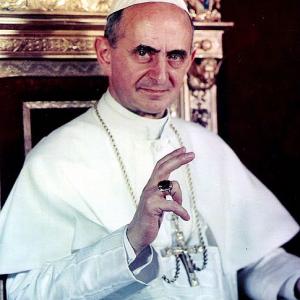
Pope Paul VI. Image via Wiki Commons, http://bit.ly/xCeHRU.
Editor's Note: The following aritcle was written in 2008, around the 40th anniversary of Humanae Vitae, the papal document that reinforced the Catholic Church's ban on artificial birth control.
Some say Pope Paul VI predicted the dangers of loosening sexual morals: widespread divorce, disease and promiscuity. Others say he cracked open a culture of dissent that has seeped into every corner of the church.
Either way, more than 40 years after Paul VI released ``Humanae Vitae'' on July 25, 1968, the papal encylical banning most forms of birth control continues to be a flashpoint in the Catholic Church.
Earlier this year, Cardinal Francis George of Chicago said Humanae Vitae set up ``a direct conflict between many people's experience ... and the authority of the church.''

